By Jean Baptiste Ndabananiye
Achieving extraordinary success is no accident—it’s a masterpiece painted with the strokes of relentless effort, daily actions, and an unshakable commitment to excellence. The road to peak performance is not paved with shortcuts or luck but with steadfast discipline, requiring us to transform dreams into reality through consistent effort. Icons like the late Pablo Picasso, Abraham Lincoln, and Vince Lombardi didn’t just speak of greatness—they lived it. Their words, brimming with timeless wisdom, echo across generations, challenging us to rise, act, and persevere.
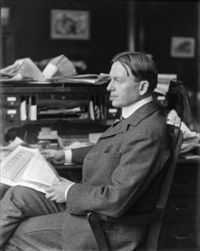
In this article, we delve into the lives and philosophies of these visionaries, exploring how their insights on hard work and discipline hold the key to unlocking your potential. Let their stories ignite the fire within you to relentlessly pursue your noble goals and turn aspirations into triumphs. Like all articles on this platform, this article is divided into sections, for better readability.
Hard work and consistent action: the foundation of success
Accomplishing peak performance demands hard work—specifically, the daily pursuit of actions that pave the way to immense success. Extraordinary achievements are built upon deliberate habits and unwavering dedication to moving closer to your goals each day.
It doesn’t involve sporadic bursts of effort but about sustained consistency over time. The greatest successes are often the result of countless small steps that, when taken day after day, lead to monumental outcomes. Hard work compounds, and each action, no matter how small, contributes to the larger vision you are building. The path to greatness is not a sprint, but a marathon that requires patience, resilience, and an unwavering commitment to keep moving forward.
The power of small but consistent actions
Various famous personalities including those already mentioned in the introduction defend that regular actions—how small they appeared—constitute the very foundation that will catapult you into the success that you desire. Many accomplished individuals, including those mentioned, emphasize that progress often begins with seemingly insignificant steps, which accumulate over time to create momentum and ultimately lead to significant success.
The smallest actions, when repeated consistently, build habits that form the backbone of extraordinary achievements. These incremental steps create a ripple effect, propelling you forward in ways that may not be immediately visible, but are crucial for long-term success. Over time, what seemed like insignificant actions become the stepping stones to breakthroughs that redefine your potential.
Practical application of wisdom: learning from the experts
The brief biographies of some of these accomplished figures, provided in this article, highlight their remarkable genius. However, their peak performance and incredible success stem not only from their extraordinary talent but also from the practical application of the wisdom they once shared—insights revived in this article.
These personalities have earned credibility in their views on hard work, exemplifying extraordinary dedication and achieving monumental accomplishments. Their affirmation that consistent action constitutes the key to massive success deserves trust. This article builds upon their statements, to emphasize the importance of taking steps toward achieving your noble goals. Remember that these steps should generally be daily.
The late Pablo Picasso: a legacy of discipline and action
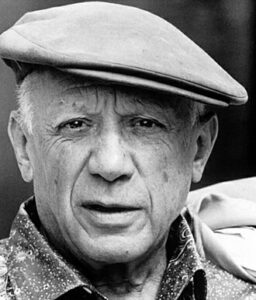
Pablo Picasso is one of those personalities who once said “Action is the foundational key to all success. It is your work in life that is the ultimate seduction. Never permit a dichotomy to rule your life, a dichotomy in which you hate what you do so you can have pleasure in your spare time.
Look for a situation in which your work will give you as much happiness as your spare time. Others have seen what is and asked why. I have seen what could be and asked why not. I begin with an idea and then it becomes something else.”
Picasso (October 1881 – April 1973) was a Spanish painter, sculptor, printmaker, ceramicist, and theatre designer who spent most of his adult life in France. One of the most influential artists of the 20th century, he is known for co-founding the Cubist movement, the invention of constructed sculpture, the co-invention of collage, and for the wide variety of styles that he helped to develop and explore.
He produced famous works like the anti-war painting Guernica (1937), a dramatic portrayal of the bombing of Guernica by German and Italian air forces during the Spanish Civil War. Picasso demonstrated extraordinary artistic talent in his early years, painting in a naturalistic manner through his childhood and adolescence.
During the first decade of the 20th century, his style changed as he experimented on different theories, techniques, and ideas. After 1906, the Fauvist work of the older artist Henri Matisse motivated Picasso to explore more radical styles, beginning a fruitful rivalry between the two artists, who subsequently were often paired by critics as the leaders of modern art.
Kirstin O’Donovan: the importance of consistency in success

Picasso is echoed by Kirstin O´Donovan, a Productivity Coach who also carries remarkable success. “Always taking continuous action, when you go to the gym, you have to go regularly to really see new results and the same goes for success. You have to take a lot of regular and continuous action if you want to have more than ordinary results. Dreaming, willing and planning alone will not get you there, continuous action will.”
O’Donovan is a multinational business coach native to South Africa and currently based in Spain since 2007, author, and founder of Top Results Coaching—an international company providing coaching services in various countries.
With more than a decade in the field of coaching and personal development, she provides her expertise to help entrepreneurs and small business owners and directors to improve results and performance. She also serves top-level, corporate executives in Spain, providing coaching and skills training. Kirstin provides executive training, workshops, and seminars for multiple international organizations in performance and time management, motivation, team development, negotiation, and communication skills.
She also writes for various international publications in small business and personal development. Kirstin holds various qualifications, certificates, and credentials related to personal and business coaching. She is the author of The Entrepreneur’s Guide to Time Management and Co-Author of The Confident Woman and There is GOLD inside YOU.
The late Robert Collier: the sum of small efforts
Robert Collier was a self-help and New Thought metaphysical books writer who lived and wrote during the first half of the 20th century. He is best known for his book “The Secret of the Ages” which sold hundreds of thousands of copies during his lifetime. He once stated “Success is the sum of small efforts – repeated day in and day out. You have to sow before you can reap.”
“Every contrivance of man, every tool, every instrument, every utensil, every article designed for use, of each and every kind, evolved from very simple beginnings. If you procrastinate when faced with a big difficult problem, break the problem into parts, and handle one part at a time. If you don’t make things happen then things will happen to you,” also said this man—who lived from April, 1885 to January, 1950 in the United States—before adding “Plant the seed of desire in your mind and it forms a nucleus with power to attract to itself everything needed for its fulfillment.
As fast as each opportunity presents itself, use it! No matter how tiny an opportunity it may be, use it! Start where you are. Opportunity lies right where you are. Take advantage of every opportunity of service. Take the first step, and your mind will mobilize all its forces to your aid. But the first essential is that you begin. Once the battle is started, all that is within and without you will come to your assistance. The first essentials, of course, is to know what you want. The first principle of success is desire – knowing what you want. Desire is the planting of your seed.”
Vince Lombardi: success and determination
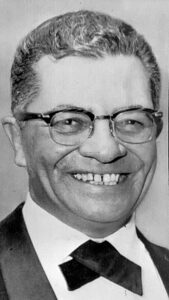
Vince Lombardi (June 11, 1913 – September 3, 1970), in full, Vincent Thomas Lombardi, was an American football coach and executive in the National Football League. Lombardi is considered by many to be the greatest coach in football history, and he is recognized as one of the greatest coaches and leaders in the history of all American sports. He said “The price of success is hard work, dedication to the job at hand, and the determination that whether we win or lose, we have applied the best of ourselves to the task at hand.”
Lombardi’s philosophy of hard work and dedication resonates beyond the world of sports, extending into all areas of achievement. His emphasis on giving your best, regardless of the outcome, reflects a mindset that values the process as much as the result.
Lombardi understood that true success is not determined by immediate victories, but by the consistent effort, discipline, and commitment put forth every single day. His unyielding pursuit of excellence, coupled with his belief in the value of perseverance, set him apart as not just a coach, but a symbol of leadership and resilience. By adopting this mentality, individuals can learn to embrace each step in their journey, understanding that every effort, no matter how small, is a vital part of the path to greatness.
Abraham Lincoln: Ignorance, Confidence, and Success
Abraham Lincoln, was an American lawyer, politician, and statesman who served as the 16th president of the United States from 1861 until his assassination in 1865. He once said “All you need in this life is ignorance and confidence, and then success is sure.” He was a self-taught lawyer, legislator, and vocal opponent of slavery and is particularly known for leading the nation during the Civil War, and enacting the Emancipation Proclamation on January 1, 1863, announcing, “that all persons held as slaves within the rebellious areas are, and henceforward shall be free.”
The Civil War (April 12, 1861 – May 26, 1865) was a civil war in the United States fought between the Union “the North” and the Confederacy “the South,” the latter formed by states that had seceded. The central cause of the war was the dispute over whether slavery would be permitted to expand into the western territories, leading to more slave states, or be prevented from doing so— which was widely believed would place slavery on a course of ultimate extinction.
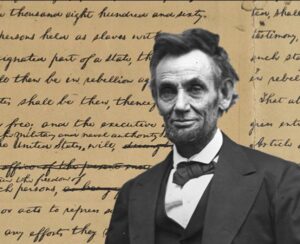
Lincoln’s quote, “All you need in this life is ignorance and confidence, and then success is sure,” is a provocative and thought-provoking statement that challenges conventional views of success. On the surface, it might seem contradictory, implying that knowledge and expertise are secondary to blind belief in oneself. However, a deeper exploration reveals the wisdom behind Lincoln’s words, emphasizing two crucial elements often overlooked in the pursuit of success: the power of unshakable self-confidence and the strength that can come from a lack of fear or hesitation to act.
Ignorance, in this context, can be understood not as a lack of intelligence, but as the absence of limiting beliefs or preconceived notions about what is possible. When individuals are unaware of the challenges, limitations, or complexities ahead, they are less likely to be intimidated or paralyzed by doubt. They approach problems with fresh perspectives, creativity, and open minds, free from the constraints of “conventional wisdom” or “known boundaries.”
Confidence, on the other hand, fuels the perseverance and resilience required to overcome setbacks and challenges that certainly arise on the path. It propels individuals forward even when faced with obstacles or uncertainties. The belief in one’s ability to succeed, despite a lack of knowledge or certainty, can drive bold actions that lead to innovation and breakthrough achievements.
Together, these two traits—ignorance and confidence—form a powerful combination. Ignorance, in this case, allows individuals to venture into uncharted territories without being paralyzed by the fear of failure. Confidence compels them to move forward, persist in the face of adversity, and take bold steps toward their goals. In a world where many are held back by fear, doubt, or a deep awareness of potential obstacles, Lincoln’s quote serves as a reminder that it is the audacity to act and the unshakable belief in success that lead to extraordinary accomplishments.
Jean Paul Getty: the formula for success
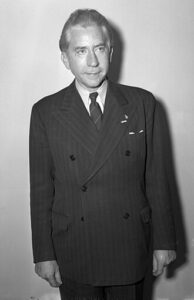
Jean Paul Getty was an American-born British petroleum industrialist who founded the Getty Oil Company in 1942 and was the patriarch of the Getty family. The Getty family is of Scots-Irish ancestry from their patrilineal lineage, their ancestors having immigrated to North America from Ireland. This man, having lived from December, 1892 to June, 1976, once said “Formula for success: rise early, work hard, strike [discover underground] oil.”
Jean Paul Getty’s formula for success, “rise early, work hard, strike [discover underground] oil,” encapsulates his relentless drive and unyielding dedication to achieving success. Getty’s path to wealth and prominence was shaped by a tireless work ethic, an unwavering focus on his goals, and the ability to identify and seize opportunities.
By rising early, he emphasized the importance of discipline and the daily commitment required to excel, setting a foundation for productivity and forward momentum. Working hard, for Getty, was not simply about laboring long hours; it was about smart, efficient effort aimed at creating and seizing opportunities for growth. His phrase “strike oil” alludes to the idea of finding immense value where others might overlook—an expression of his astute business acumen and ability to recognize potential in unconventional places.
Getty’s success was not just based on luck but on a calculated combination of persistence, hard work, and strategic thinking, which ultimately led to the establishment of the Getty Oil Company. His legacy serves as a testament to the power of dedication, vision, and taking decisive action in the pursuit of one’s goals.